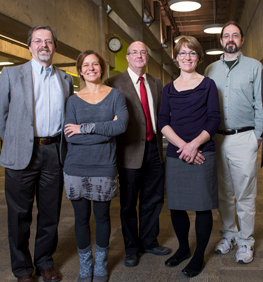Five Dept of Physics Faculty Members Elected Fellows of American Physical Society
 Five Carnegie Mellon faculty members in the Dept of Physics have been elected fellows of the American Physical Society(APS). This represents the largest group of APS Fellows Carnegie Mellon has had in a single year.
Five Carnegie Mellon faculty members in the Dept of Physics have been elected fellows of the American Physical Society(APS). This represents the largest group of APS Fellows Carnegie Mellon has had in a single year.
The APS limits the number of fellows to no more than one-half of 1 percent of its more than 50,000 members. According to the APS, fellowship is a distinct honor signifying recognition by one's professional peers. Fellows are elected based on their contributions to the physics enterprise, through research, application of physics, leadership and service, or contributions to physics education.
"We are very proud of the accomplishments of our new fellows," said Stephen Garoff, head of Carnegie Mellon's Department of Physics. "They join 15 other Carnegie Mellon faculty from both the Mellon College of Science and College of Engineering who are fellows of the society."
The new fellows are recognized for their work in a wide range of areas, including examining physics from the scale of the smallest subatomic particles to outer reaches of the cosmos, discovering new fundamental particles and laws of nature, and unraveling the scientific underpinnings of the behavior of materials and phenomena that govern our everyday lives.
"It is in the best tradition of Carnegie Mellon that these and previous fellows of the American Physical Society from CMU come from more than one college and multiple departments, with many benefitting from the rich interdisciplinary collaborations available on our campus," Garoff said.
The 2014 APS fellows from the Carnegie Mellon Dept of Physics are:
Shelley L. Anna, professor of chemical engineering and mechanical engineering, and courtesy professor of physics, was recognized for her contributions in extensional rheology and droplet microfluidics, and in particular for elucidating and manipulating the effect of surfactant in microfluidic tip streaming.
Roy Briere, professor of physics, was recognized for his important contributions to the physics of particles containing b and c quarks, which were crucial to the success of the CLEO and BESIII experiments, and for his leadership roles in those experiments.
Tiziana Di Matteo, professor of physics, was recognized for her pioneering work in computational cosmology, which has made fundamental contributions to our understanding of the impact and growth of black holes in the structure and formation of the universe.
Colin Morningstar, professor of physics, was recognized for his outstanding contributions to understand the strong force and its hadron spectroscopy based on the fundamental theory of quantum chromodynamics.
Reinhard A. Schumacher, professor of physics, was recognized for his extensive studies of the photo- and electro-production of hyperons and the impact these studies have on our understanding of the spectrum of baryons.
The American Physical Society is a nonprofit membership organization working to advance and diffuse the knowledge of physics through its outstanding research journals, scientific meetings, and education, outreach, advocacy and international activities. APS represents over 50,000 members, including physicists in academia, national laboratories and industry in the United States and throughout the world. Current APS fellows in the Dept of Physics include Steve Garoff, Fred Gilman, Mathias Loesche, Sara Majetich, Curtis Meyer, Ira Rothstein, Robert Swendsen, and Mike Widom. APS fellows in the Emeritus faculty of the Dept of Physics include Richard Edelstein, Robert Griffiths, Ling Fong Li, John Nagle, Fred Reif, Robert Sekerka, and Lincoln Wolfenstein.